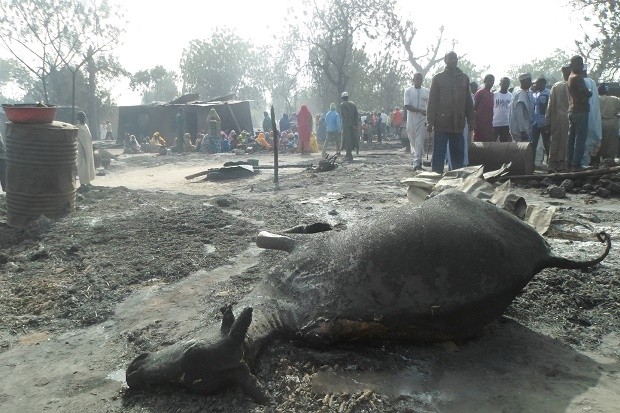Boko Haram seized 300 kids in second 2014 school attack — locals

People gather around a dead animal and burnt out houses following an attack by Boko Haram in Dalori village 5 kilometers (3 miles) from Maiduguri, Nigeria , on Jan. 31, 2016. A survivor hidden in a tree says he watched Boko Haram extremists firebomb huts and listened to the screams of children among people burned to death in the latest attack by Nigeria’s homegrown Islamic extremists. AP
KANO, Nigeria — Boko Haram seized hundreds of children from a remote town in northeast Nigeria in late 2014 but initial calls to report the kidnapping were ignored with locals fearful of the government’s response, residents told AFP on Wednesday.
A local government administrator, a local chief, another elder and a resident all said some 300 children were among the 500 girls, boys and women taken from Damasak on Monday November 24, 2014.
The numbers involved surpass even the 276 schoolgirls who were taken from Chibok in April the same year, which drew worldwide condemnation and calls for action.
READ: Boko Haram burns kids alive in Nigeria, 86 dead — officials | Would-be Boko Haram bomber ‘caught by her ponytail’
But the government of former president Goodluck Jonathan in March last year denied reports of the Damasak kidnapping while a local senator and a senior intelligence source also doubted the claim.
Article continues after this advertisementThe administrator, whose seven-year-old child was among those abducted, said: “We kept quiet on the kidnap out of fear of drawing the wrath of the government, which was already grappling with the embarrassment of the kidnap of the Chibok schoolgirls.
Article continues after this advertisement“Every parent was afraid to speak out,” he said on condition of anonymity.
Locals who managed to flee alerted their political representatives in the Nigerian Senate and House of Representatives but “they kept mute and ignored us”, he added.
“The government didn’t want the news out,” he said, explaining that the decision to speak out publicly came after Human Rights Watch highlighted the case on Tuesday.
Held in a primary school
“They went to the private school and Islamic seminaries and carted away children as young as five,” added the local chief, who also asked not to be identified.
“They also went into town and forcibly seized children from their mothers, children too old to be breastfed. My 16 nephews were among the children kidnapped. They were aged between five and 16.”
Hundreds fled across the river that separates Damasak from Diffa in neighboring Niger but many drowned, he said, adding that he returned to bury “over 200 dead bodies in mass graves”.
The Damasak elder said the insurgents killed more than 200 in the initial attack, which happened on market day.
HRW’s report interviewed multiple witnesses to the abduction, who said the hostages were initially kept at a primary school, which was then turned into a military base.
The schoolchildren were aged seven to 17 but one witness told HRW she had not seen her two-year-old daughter and four-year-old son since they were seized on the day of the attack.
Men were detained separately and forced to dispose of bodies from the streets and the river in makeshift graves, the witnesses said, with one claiming to have seen hundreds of bodies.
‘Government must wake up’
Troops from Chad and Niger liberated Damasak on March 9 last year and discovered about 100 bodies in a mass grave under a bridge on the edge of the town. Some had been decapitated and others shot.
Hundreds more bodies, including of women and children, were found the following month on the streets, in houses and in the dried-up river, local residents said at the time.
They were covered by sand from the encroaching desert and the authorities ordered their reburial in 20 mass graves.
Both the HRW testimony and that gathered by AFP underlines the brutality of a conflict that has claimed an estimated 20,000 lives and made more than 2.6 million people homeless since 2009.
Boko Haram has long used kidnapping as a weapon of war, forcibly conscripting young boys and men into their ranks and using women and young girls as sex slaves and suicide bombers.
But the findings will also raise fresh questions about the previous government’s handling of the insurgency, after its response to the Chibok abduction was condemned as slow and lackluster.
Nearly two years on, 219 schoolgirls are still being held.
HRW’s senior Nigeria researcher Mausi Segun, however, said while Boko Haram’s abductions could not be justified, President Muhammadu Buhari’s government, in power since May last year, also had to act.
“Three hundred children have been missing for a year and yet there has been not a word from the Nigerian government,” she said in a statement.
“The authorities need to wake up and find out where the Damasak children and other captives are and take urgent steps to free them.”